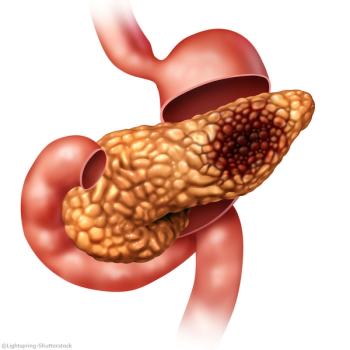
- ONCOLOGY Vol 10 No 9
- Volume 10
- Issue 9
Gemcitabine Shows Promise as Combination Agent in NSCLC
Gemcitabine (Gemzar), recently approved by the FDA as a treatment IND for patients with advanced or metastatic pancreatic cancer, has shown promise in the treatment of non-small-cell lung cancer (NSCLC), both as a single agent and in combination with other chemotherapy drugs, Alan Sandler, md, reported at a symposium held at the Chemotherapy Foundation meeting last year.
Gemcitabine (Gemzar), recently approved by the FDA as a treatmentIND for patients with advanced or metastatic pancreatic cancer,has shown promise in the treatment of non-small-cell lung cancer(NSCLC), both as a single agent and in combination with otherchemotherapy drugs, Alan Sandler, md, reported at a symposiumheld at the Chemotherapy Foundation meeting last year.
Structurally related to cytarabine (ara-C), gemcitabine accumulatesto a greater degree and is less readily eliminated from tumorcells than ara-C. Incorporated into DNA, gemcitabine results inchain termination and inhibits enzymes required for DNA synthesis,he explained.
Gemcitabine has been studied extensively as a single agent inpreviously untreated NSCLC in Europe, Japan, South Africa, andCanada. In several studies involving nearly 600 evaluable patients,responses ranged from 20% to 27%, said Dr. Sandler assistant professorof hematology/oncology, and medical director, Thoracic OncologyProgram, Indiana University School of Medicine, Indianapolis.
Phase I/II studies have established a maximally tolerated gemcitabinedose of 1,250 mg/m²/wk, with myelosuppression and thrombocytopeniathe dose-limiting toxicities. Nonhematologic toxicities includereversible hepatotoxicity, proteinuria, mild skin rash with orwithout pruritus, and nausea with vomiting.
Dr. Sandler reported on five recent phase II studies of gemcitabinein combination with cisplatin (Platinol). All included a regimenof weekly gemcitabine for 3 weeks, with 1 week off; cisplatinwas given in varying doses.
In patients with previously untreated stage III NSCLC, responserates ranged from 31% to 55%, and median survival rates were ashigh as 9.9 months. The most favorable response was seen in anItalian study that administered gemcitabine weekly, 1,000 mg/m²on days 1, 8, and 15, with cisplatin 100 mg/m² on day 2.With a median follow-up of 11 months, median survival has notyet been reached for that regimen.
Studies are ongoing for gemcitabine in combination with carboplatin(Paraplatin) and ifosfamide (Ifex), with no response results yetreported, he said.
Articles in this issue
over 29 years ago
Antisense Gene Therapy Trials Underway in Patients With CMLover 29 years ago
BOOK REVIEW: Leukemiaover 29 years ago
Most Terminal AIDS Patients Want to Be Revived if Their Heart Stopsover 29 years ago
Disease Management: State of the Art in Pancreatic Cancerover 29 years ago
How to Better Communicate Cancer Risk to Patientsover 29 years ago
Data Review Shows Fruits and Vegetables Can Block Major CancersNewsletter
Stay up to date on recent advances in the multidisciplinary approach to cancer.






































